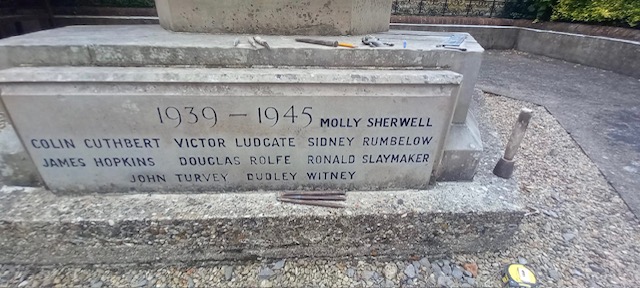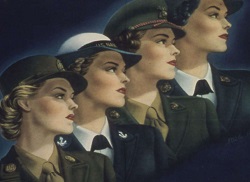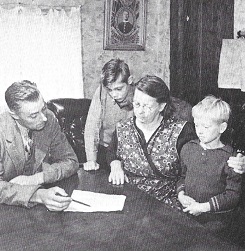World War 2
The men in Chinnor were not alone in volunteering for the armed services as 8 women from Chinnor enlisted in the forces. Dr Leverkus the first Dr or GP in the village had a sister Elsie who joined up and was commissioned as a 2nd Subaltern in the ATS.
Chinnor women at war
Chinnor women played their part in both World Wars taking on the jobs of their men who had left for the front. Much of this would have been farming and in World War 11 keeping the allotment growing for much needed food.
John Neighbour had an aunty whose name was Annie and served as a VAD at the front during the battle of the Somme.
Those lost from Chinnor in the World Wars have their names engraved on the Chinnor war memorial.
June 2023
Over the last 6 months a great deal of research has been carried out regarding one particular ATS girl who was based in Chinnor.
w99184 Pte Molly Sherwell - ATS (d.1944)
Molly Joined the ATS early on in the war and was based in Chinnor.
It would seem that Molly trained at Special Training School 52 which was one of the Signals Directorate at Beulieu where SOE members were trained in cypher, wireless procedures, codes and security work for work in the field as operators. It is surmised that Molly then worked at Thame Park which also trained SOE operatives. Molly lived at No 5 The High Street, Chinnor.
Molly lost her life when home on leave visiting her parents in Beckenham during enemy action and this is where she was initially burried by the War Graves Commission. In 1952 Molly was reinterred in Bedford Cemetary.
Chinnor Heritage approached The Royal British Legion (RBL) regarding Molly as currently there was no known recognition of her service during the War. The RBL agreed that Molly indeed did meet the criteria to have her name carved on the Chinnor War Memorial along with all who had served and lost their lives in war, as well as adding her name into the Chinnor & District Branch of the RBL book of remembrance in St Andrew's Church.
For the first time ever, at the Roll of Honour call on Remembrance Sunday 12th November 2023, in Chinnor, Molly's name will be read out along with all who served and lost their lives in war.

The Women's Land Army - for England and Wales
Members leaflet (extracts)
Your promise to the Land Army is to give full-time service on the land while the war lasts, work wherever in England or Wales you may be needed, to accept through Lad Army organisation the job for which you are considered best suited, to stick to that job and not to leave it without the Land Army's knowledge and approval. Remember this promise and make a firm resolve that you will keep to it.
The Land Army's Promise to you is of regular work at a guaranteed weekly wage which will leave you with not less than 22/6 (or 18/- (shillings) if you are under 18 years of age) after you have paid for board and lodging, at least one week's holiday in the year on full pay, a free half-day each week, free travel to your job and a free rail warrant to any station in England or Wales after each six months of satisfactory service, free working uniform and all necessary replacements.
When you first join the Land Army, you will not be called up for work on the land until a suitable job and billet have been found for you. Till then you should remain in whatever may be your ordinary occupation.
Many women joined The Land Army and were issued with the Member's Leaflet advising of what to do and expect. Many had never experienced the countryside coming from large towns. To some it was quite a shock. A full copy of the Member's Leaflet can be found on the Chinnor Heritage information trolley in the Chinnor Library

More lives lost and families bereaved once more 1939 - 1945

London Children evacuated to Chinnor
Evacuees in Chinnor
Background to the national evacuation plan stemmed from the experiences of the Zeppelin raids of the First World War during which 14,000 civilians were killed, first by the Zeppelins and later in 1917, Gotha-Giant heavy bombers. In 1917, one bomb fell on a London County Council school in Poplar killing 18 children. As aircraft design developed during the 1930s it became clear that the English Channel, our traditional island defence, could no longer protect the population from direct enemy action.